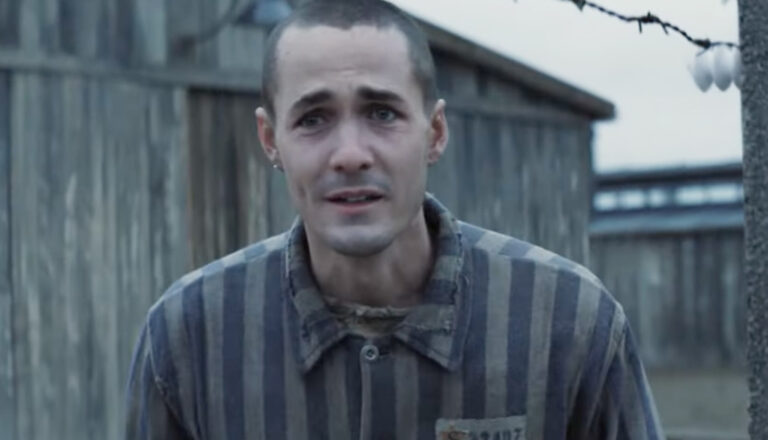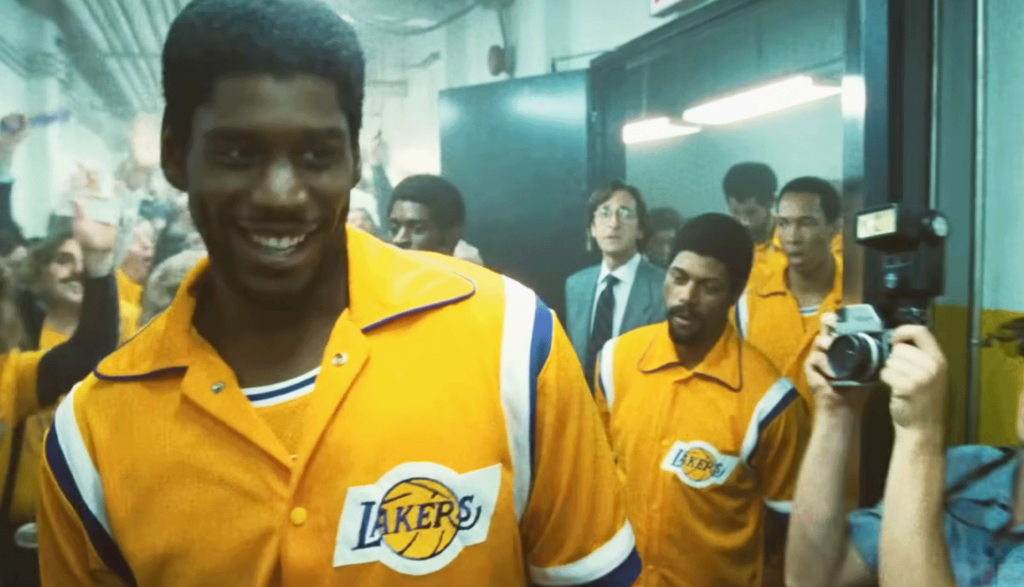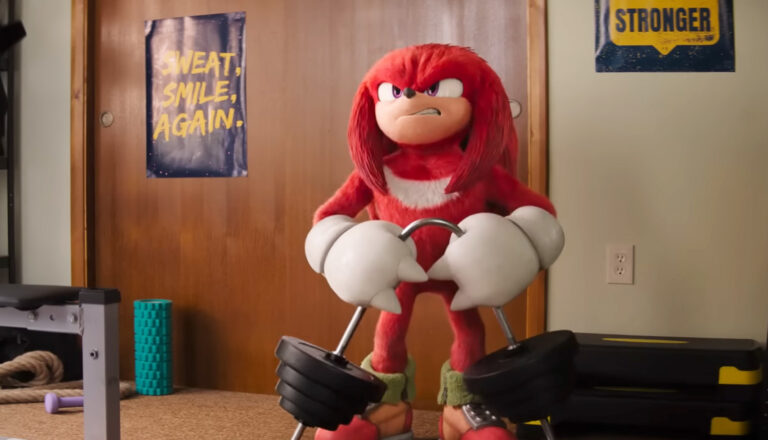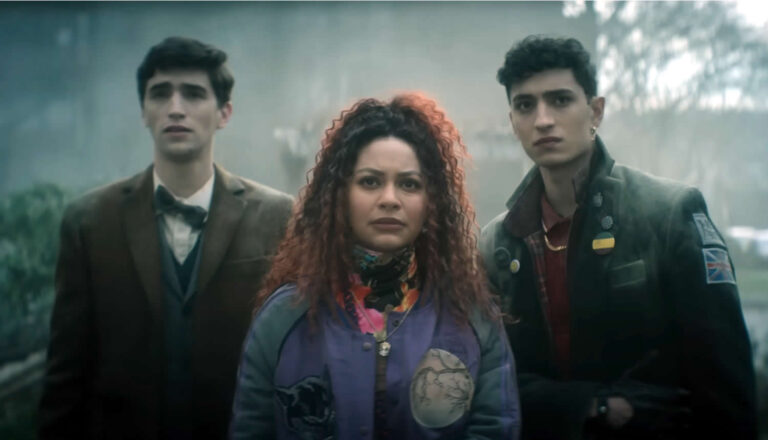
The Tattooist of Auschwitz
The Tattooist of Auschwitz is a little like its titular character. It’s painful. It gets under your skin. And it just might leave a mark.

Spoiler Warning: The Los Angeles Lakers of the 1980s were pretty good.
In 10 years, the Lakers won five national championships and pumped new life into the moribund National Basketball Association. Its 1980s vaunted “Showtime” teams boasted two all-time greats (Kareem Abdul-Jabbar and Ervin “Magic” Johnson) and a bevy of future hall-of-famers. Hollywood glitterati filled the stands and, for a time, the NBA galaxy rotated around the Lakers’ L.A. Forum.
Seems like, with all that talent, success would’ve been easy—as certain as a lazy skyhook, as effortless as one of Magic’s no-look passes.
Max tells us differently.
Max’s Winning Time: The Rise of the Lakers Dynasty takes us into Showtime’s earliest days, when real estate mogul Jerry Buss buys a down-on-its-luck Lakers franchise and, shortly thereafter, drafts sophomore phenomenon Johnson. Magic pushes the Lakers to a higher gear and bam! L.A. wins its first Showtime-era title in 1980, Magic’s rookie year.
Still, it was anything but easy.
Abdul-Jabbar, the Lakers’ longtime leader, barely talked to Magic. The Lakers’ rotated through three coaches. Players would bicker on the court; coaches and administrators would squabble off of it. And Buss—trying to rebuild his own family even as he rekindles the Lakers’ fortune—is kind of a mess.
In Season Two of Winning Time, with Lakers’ players wearing rings on their fingers and Buss and company sitting on the top of the NBA heap, the road to glory just gets harder. On-court injuries and off-court troubles throw roadblocks in the way. Magic’s rocky relationship with his coach threatens to divide the team; his outside philandering threatens to upend his lucrative endorsements. And up in Boston, a threat to L.A.’s basketball supremacy is beginning to take shape.
Like the 1980s Lakers, Winning Time is loaded with talent. John C. Reilly and Quincy Isaiah head an A-list cast that includes the likes of Adrien Brody, Jason Segel, Jason Clarke, Michael Chiklis and Sally Field.
And like the Lakers, it seems to have all the ingredients to win.
A sports drama couldn’t ask for a better historical backstory. Certainly, the show takes plenty of liberties with that backstory: All-time Laker great Jerry West threatened to sue the show for how he was portrayed, and the real Abdul-Jabbar said that the makers “replaced solid facts with flimsy cardboard fictions that don’t go deeper and offer no revealing insights.” Even a cursory look at Lakers history will show that this historical drama goes heavy on the drama and somewhat light on the history.
But the drama is well-written, well-told and well-performed, and the characters are, at least, compelling and multidimensional. Reilly’s Buss is a business visionary and a first-class jerk. Isaiah’s Magic is an electrifying talent and, at times, a bit of a brat. Abdul-Jabbar, as played by Solomon Hughes, seems especially interesting—with the longtime star learning, uneasily, how to share space with Magic. These characters are messy, and the show makes no secret of it.
Alas, while messy characters can make for compelling drama, it can also make for tawdry viewing.
Buss and Magic both had their share of affairs, and the camera focuses far more on bedroom-based activities than on-court action. We see (and hear) plenty—up to and including full-blown nudity. Even the conversations can be lurid.
Violence is an issue, too. If you’re familiar with 1980’s B-ball, you know that on-court violence was not a rarity. That violence literally bleeds out into the real world, too. In the first season, one disgruntled ex-Laker tries to arrange a hit on the entire team. (For the record, the player—Spencer Haywood—never actually asked anyone to murder the entire team. But he does admit that he thought about it.)
And the show never lets us forget that it takes place in the 1980s, a time of (at least according to the show) unfettered hedonism and excess. Liquor flows. Tobacco smoke fogs board rooms and bars. Drug use was a huge problem in the NBA at the time, and Winning Time doesn’t turn away.
The language can be, quite honestly, appalling. The show tallies more f-bombs than baskets, and most every other word that deserves a bleep is heard here, too.
The real Abdul-Jabbar makes an interesting point regarding the show’s language issues. Winning Time suggests that he used the f-word to, essentially, tell a child actor to take a hike in the movie Airplane!—“a shorthand way of showing my perceived aloofness during that time,” Abdul-Jabbar says. But Abdul-Jabbar insists it didn’t happen and never would. And that portrayal, he suggests, could hurt his real-life Skyhook Foundation, which promotes education for inner-city kids.
“When people see this show and come away with an impression that I’m verbally abusive to children, they are less likely to support my foundation,” he writes. “That means fewer kids will be able to partake in the program. So [creator] Adam McKay is giving those kids a great big ‘f— off!’ That lasts a lot longer than the easy laugh he got out of a dishonest joke.”
Winning Time takes one of the most successful sports franchises in history and does a deep dive on one of its most compelling decade-long chapters. But while the Lakers were great, this show—at least when it comes to discernment-minded viewers is not. Indeed, Winning Time, for families, is a low-rent loser.
Fresh off the team’s 1979-80 NBA title drive, the Lakers regroup and make plans to do it again. But it’s obvious that the road to a second championship won’t be easy. Magic goes down with a serious knee injury. The Boston Celtics are putting the pieces together for their own championship drive. And for many characters, family issues threaten to upend the all-consuming drive to win.
For Kareem Abdul-Jabbar the birth of his son, Amir, might be a catalyst for self-improvement—learning how to be a better father and teammate. He admits to Magic that his other children “know the number 33 much better than they know their father.” That’s a critical piece of advice for Magic, who learns he fathered his own child out of wedlock. He’s advised to get the mother to sign a contract that would provide for the child but also keep Magic’s paternity a secret—and thus protect his lucrative endorsement deals. But Magic’s own parents (including his very Christian mother) are furious with his irresponsibility. Eventually, Magic accepts his role as a real father and visits his newly born son in the hospital.
Still, it’s a reminder that Magic’s promiscuous ways continue. We see him engaged in lurid sex with someone (we see the woman’s breasts and a great deal of movement during the extensive scene). In another, we see that Magic slept with one of his lawyers. (She’s putting back on her clothes—and her wedding ring—in the scene, and we see her in her underwear as she suggests they do the deed at her office the next time.) Magic is also shown with two women in a brief, sexually charged scene; we see a lot of skin, but nothing critical.
Magic’s onetime girlfriend sees an imaginary Magic appear on her bed and try to explain his wayward ways. “Some folk get high. Some get drunk. Me? I like to f—,” the imaginary Magic says. Later, the pair has a real phone conversation, and she asks [in very crude terms] if he ever considers the consequences before having sex. Magic admits that he never does—a nod, perhaps, to the fact that he contracted the HIV virus years later.
Buss looks at a photo album featuring pictures of naked women. In the opening title sequence, a man poses in a gold Speedo. A man exposes his rear to the camera, and several guys are seen without their shirts. Women wear bikinis, including one in a near-thong. We hear references to both Buss’s and Magic’s propensity for sex.
Magic and Abdul-Jabbar spearhead a borderline violent practice session, which leads to a serious eye injury to the latter. (We see the man’s eye flooded with blood.) Magic suffers a knee injury and writhes in pain on the basketball court. Buss berates his children for not playing hard in Monopoly and throws a tantrum (and his properties).
We hear references to the Jewish word “dayenu,” which means (we’re told) “It is enough.” Red Auerbach, owner of the Boston Celtics, tells Buss that he should be satisfied with his one title and walk away. “Some advice from an old Jew?” he says. “Let it be enough.” We hear other references to God, and Magic’s mother tells Magic’s old girlfriend to not give up on her son so quickly. “With the help of the Lord and a good woman, a man can find a way to where he belongs,” she says.
Characters drink champagne, whiskey and plenty of other forms of liquor, sometimes during business meetings. Buss seems to get intoxicated. We see characters smoke cigars and cigarettes, as well. We hear the f-word more than 80 times and the s-word 20 times. We also hear “a–,” “b–ch,” “d–n,” “h—” and “n—er. God’s name is misused a half-dozen times, most with the word “d–n.” Jesus’ name is abused three times.


Paul Asay has been part of the Plugged In staff since 2007, watching and reviewing roughly 15 quintillion movies and television shows. He’s written for a number of other publications, too, including Time, The Washington Post and Christianity Today. The author of several books, Paul loves to find spirituality in unexpected places, including popular entertainment, and he loves all things superhero. His vices include James Bond films, Mountain Dew and terrible B-grade movies. He’s married, has two children and a neurotic dog, runs marathons on occasion and hopes to someday own his own tuxedo. Feel free to follow him on Twitter @AsayPaul.

The Tattooist of Auschwitz is a little like its titular character. It’s painful. It gets under your skin. And it just might leave a mark.

The Sonic spinoff blends explosive adventure and road-trip-buddy-comedy into a fun romp for both kids and diehard fans.

Dead Boy Detectives targets teens in style and story. But it comes with very adult, problematic content.